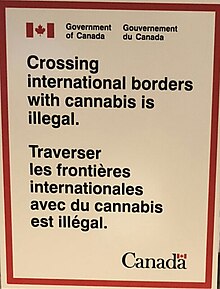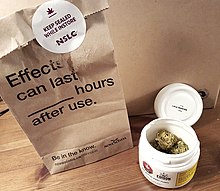Cannabis laws of Canada by province or territory
Adults are also allowed to make cannabis-infused food and drinks "as long as organic solvents are not used to create concentrated products.
[5][6][7] While each household is allowed to grow up to four cannabis plants from "licensed seed or seedlings", Quebec chose to be excluded from this aspect of the legislation so it is not legal in the province.
[9] Cannabis companies in Canada are not allowed to promote themselves through TV commercials, billboards, or glossy magazine ads, sponsor people or events, or put their names on sports and cultural facilities.
[40][41] Bill 26 was introduced in November, 2017 and will make cannabis consumption legal for adults 18 years of age and older.
[43] Under the bill, private retailers may sell cannabis to the public, but online sales are reserved to the provincial government.
[48] After public consultation, British Columbia released a provincial regulatory framework for the sale and use of cannabis for recreational use.
There would be a government-run wholesale distribution model and for on-line sales, although private and publicly run retail stores would operate.
[49] In early October 2018, BC released its final set of rules and plans, replacing the July 2018 Interim Licensing Regulation.
Purchases can be made on-line or at the provincially licensed retail stores operated by private enterprise companies.
[54] In October 2019, then Premier Brian Pallister announced plans to ban consumption of edibles in public in Manitoba by December.
[48] In 2017 the government announced that home-run New Brunswick Liquor Corporation would take charge of opening up to 20 cannabis stores in the province.
[59] As of 10 January 2019, there were 20 (government-run) retail stores in operation, but, apparently due to a shortage of product, had recently laid off some staff.
Cannabis is sold in dried flower, oil, and capsule form, in economy, midstream and premium quality levels.
[62] The plan was for the Northwest Territories Liquor Commission to manage all import and distribution of cannabis, through retail outlets and by-mail.
[48] The province's plan was for cannabis to be sold alongside alcohol at current stores run by the Nova Scotia Liquor Corporation (NSLC).
All of the product was initially provided by Tweed which offers 10 different strains of marijuana and lines like Leafs by Snoop.
OCS was initially planned to open a network of retail stores across the province, with several key cities having at least one store open in time for legalization, but the plans were shelved after the 2018 provincial election by the newly elected premier, Doug Ford in favour of allowing licensed private retailers.
[71] Despite this, 77 out of 414 municipal governments such as those of Mississauga, Markham, Vaughan, Richmond Hill, Oakville, Whitby, and Pickering among others, have passed by-laws prohibiting retail sales.
[72][73][74] The minimum legal age to purchase and use cannabis in Ontario is 19, and adults can carry up to 30 grams (1 oz) in public.
[76] In 2019, the government initially issued 25 retail licenses for brick-and-mortar stores to sell recreational cannabis; the selection was based on strict criteria and a lottery system.
[81] By early October 2018, all of the plans and rules for recreational cannabis had been finalized for Prince Edward Island.
The Highway Traffic Act will be amended to include cannabis intoxication in a motor vehicle, similar to alcohol.
[83] In October 2018, Lionel Carmant, the junior health minister announced on behalf of the Coalition Avenir Québec (CAQ) government that the legal age to consume will be raised to 21 from 18, effective 1 January 2020.
A full 150 different products are sold, in dried, fresh or oil format, but not edibles, as well as accessories such as vaporizers.
[88] As of 13 August 2022, there were 87 (government-run) retail stores in operation [89] In March 2018, the Saskatchewan Liquor and Gaming Authority released its framework for distribution, sale and use of cannabis.
The province will adopt the federal minimum standards around home production, including a limit of four plants per household.
Adults may grow up to four marijuana plants per household for personal use; restrictions may be placed by landlords or condo corporations.
[91] Only six cannabis stores were open initially operated by private enterprise companies and licensed by the province; on-line purchases could also be made from the provincial web site.
[48] For Yukon's proposed framework, the territory planned to have one government-owned physical store in the main city of Whitehorse, and online sales to reach more distant communities.
The Yukon Liquor Corporation planned to set up a cannabis licensing board by spring 2019 to accept applications from private companies to operate retail stores.


